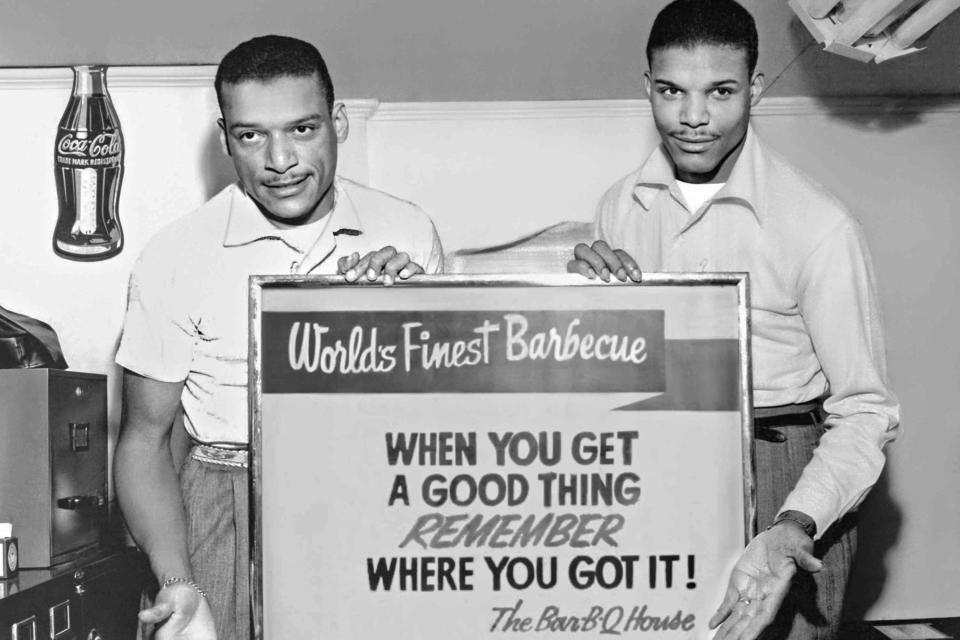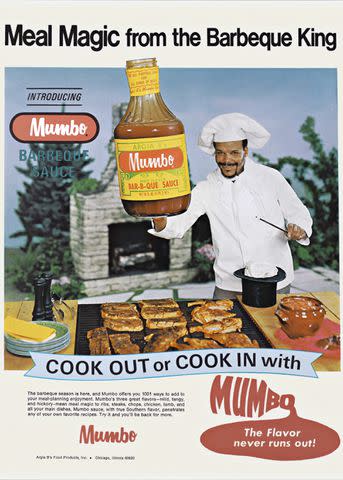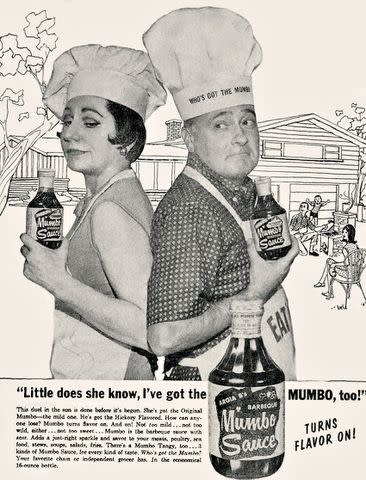A Chicago Barbecue Sauce Captures History in a Bottle
Allison Collins, the second-generation owner of Mumbo Sauce, has cracked the code to archiving her business.

Courtesy of Select Brands LLC
Allison Collins has never known life without Mumbo Sauce — it drizzles over her earliest memories. Her father, Argia B. Collins, created the tomatoey, vinegar-based barbecue sauce in the early 1950s at his eponymous restaurant in Chicago. Argia B’s Bar-B-Q was like Allison’s second home. She jokes that scooping coleslaw into paper cups as a toddler was her first job. Decades later, as the second-generation owner of Mumbo Sauce, Allison is taking on a new role at the company: that of documentarian, archiving her family’s business, defining its broader historical significance, and recording its lasting cultural impact.
Argia was an architect of Chicago’s pork-centric regional barbecue style. He was one of the hundreds of thousands of Black Americans who moved from the South (most notably Mississippi) to Chicago during the Great Migration and one of a handful who opened a barbecue restaurant once they got there. At the rib joints that dotted Chicago’s South and West sides, each restaurant’s sauce was its calling card. But for Argia, the sauce was much more. He began selling Mumbo Sauce (not to be confused with mambo sauce, the sweet-and-sour sauce that was later popularized in Washington, D.C.) at his restaurant and at retail stores; by 1958, Argia had trademarked and turned his distinctive condiment into what is considered to be one of the oldest Black-owned bottled sauces in the nation. (Today, the sauce can be purchased online at mumbosauce.com.)
Allison is attempting to capture the gravity of this history one story and one object at a time. She has gathered memorabilia from her deceased dad’s office, including tear sheets of Mumbo Sauce ads that ran in Ebony and Life, newspaper clippings about her father, purchase orders, renderings of the Mumbo Sauce label (which, like the recipe, hasn’t changed much over the years), and a midcentury Rolodex full of names and business contacts. She’s enlisted a photographer to help restore faded images and archive them digitally.

Courtesy of Select Brands LLC
Grounded by her chosen medium of oral storytelling, a tradition that runs deep in African American culture, Allison interviewed participants in conversations that she had professionally recorded. For potential interviewees, she instinctively recalled the names of her dad’s colleagues, employees, and family members, which include a lineage of notable entrepreneurs. “As you start thinking about who you want to talk to, the list gets longer and longer,” she says.
Related: A Guide to the Essential Regional American Barbecue Sauces
What she learned from these living libraries helped Allison to see her family’s business in a new light. She heard about “obstacles that [her dad] may have had to overcome and things that [she] probably wouldn’t have known as a kid." Some stories, like the tale of a supermarket boycott spearheaded by a young Jesse Jackson in response to the redlining of Black-owned products, helped her understand how the story of Mumbo Sauce was interwoven with that of the Civil Rights Movement.

Courtesy of Select Brands LLC
Archiving the history of Mumbo Sauce has been an exercise in celebrating the tenacity and creativity of her father, herself, and the many others who have kept the independently owned food business alive for over 70 years. And it ensures that the Mumbo Sauce story will not be forgotten or erased from history like countless Black spaces and contributions, historically and presently.
Related: Black Communities Have Always Used Food as Protest
Today, it often happens at the grocery store, usually while Allison is standing beside an endcap offering samples: Someone approaches her with a personal ode to the sauce that is her family heirloom but has been a fixture on their family’s table for generations. After briefly chatting, she takes their information to contact them for an interview later. Archiving is a daily practice.
Allison is contemplating what she’ll do with her archive. She wants to write a book, and she is considering turning her footage into a short documentary. Either way, the main character will undoubtedly be Mumbo Sauce.

Courtesy of Select Brands LLC
3 tips for archiving the history of your business
1. Get organized.
Visual documentation is one advantage that most emerging businesses have already, but instead of leaving those images on social platforms, they should be backed up, labeled, and categorized.
2. Get going.
“Experiencing the pandemic and recognizing how many people did not make it, that really set a fire under me of putting a plan together,” Allison says. She prioritizes elders in her outreach because their stories, wisdom, and knowledge are most at risk of being lost if not preserved.
3. Get help.
Archiving your business is a major undertaking, especially if you’re also running it. Enlist specialists, using a website like Thumbtack, for tasks that can be easily delegated, or ask friends and family to help.
For more Food & Wine news, make sure to sign up for our newsletter!
Read the original article on Food & Wine.


